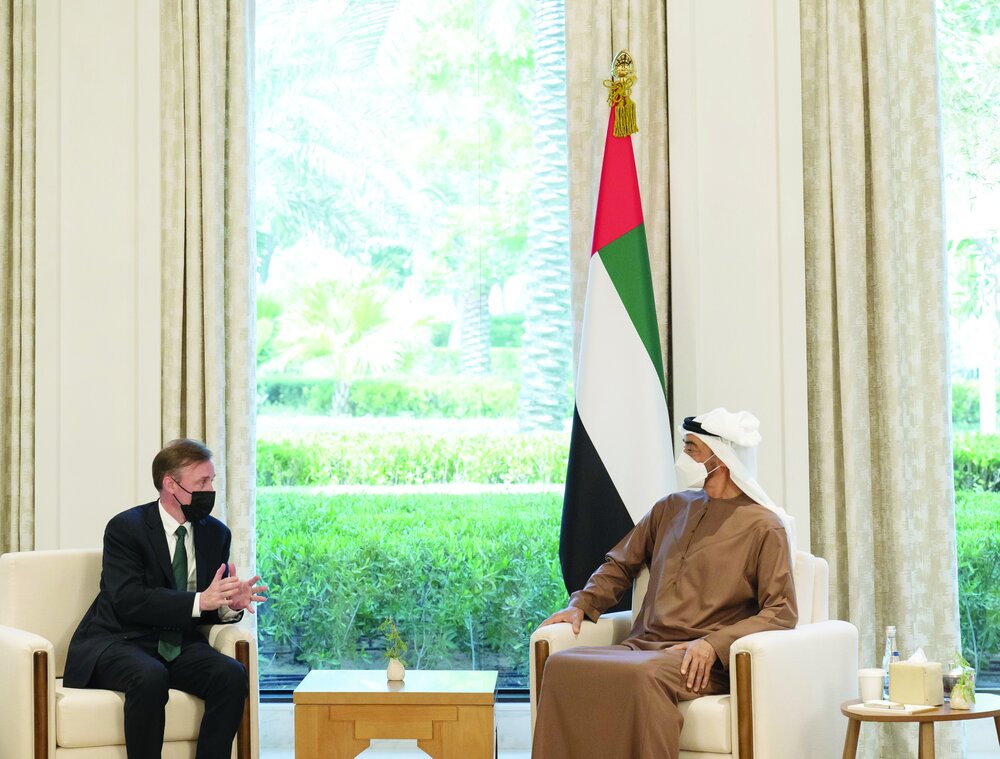
TEHRAN — Jake Sullivan, the United States National Security Advisor, has started a tour of certain Middle Eastern countries. He arrived in the UAEA on September 27. The American mainstream media tries to portray the agenda of the trip is focused on Iran and Yemen, but it is really the case!
Sheikh Mohammed bin Zayed, the Crown Prince of Abu Dhabi and Deputy Supreme Commander of the Armed Forces, paid an official visit to the UK on September 15.
According to The National news website, the UAE and the UK have agreed to establish a "Partnership for the Future" based on two main pillars: driving sustainable prosperity and addressing global issues.
The visit came days after the United States signed a trilateral partnership with the United Kingdom and Australia, dubbed as AUKUS. The pact is aimed to provide Australia with nuclear-powered submarines.
Soon after the deal was signed, United States’ allies and friends all over the world started to get worried. This came a few weeks after the scandalous U.S. exit from Afghanistan. That’s when the UAE started to feel the need to distance itself from the United States. Abu Dhabi had a strong feeling of betrayal. Bin Zayed and Boris Johnson also stated that they would work closely together during the UAE's 2022-2023 term as a member of the United Nations Security Council.
The UAE is already a key partner for the UK, with total trade between the two countries worth £18.6bn and joint investment flows of £13.4bn in 2019.
As a result of the trip, the UAE will funnel £10 billion ($13.8bn) over five years into promising companies that operate in the clean energy, technology, and infrastructure industries.
The next stop for bin Zayed was France.
After his meeting with the French President, Emmanuel Macron, Sheikh Mohamed said the two countries support values of tolerance, promote dialogue, interaction, and coexistence among peoples, civilizations, and cultures, reject intolerance and hatred and work for peace, stability, and development in the Middle East and the world, UAE state news agency said.
French Foreign Minister Jean Yves Le Drian hosted his counterpart Sheikh Abdullah bin Zayed at a lunch at the Quai d’Orsay ahead of a signing ceremony for two new agreements.
One agreement for enhanced cooperation in medicine, and a second agreement between the Banque Publique d’Investissement (BPI), the French state investment bank, and Mubadala for a €300 million project, with scope for an additional €700 million to invest in start-up firms promoting innovation in the health sector.
“France tends to send its best ambassadors, its best diplomats to the UAE,” Karim Bitar, a Senior Fellow at the Institute for International and Strategic Affairs in Paris, told The National. “It's a major Arab partner.”
The visits were interpreted as a sign of distrust among the UAE, Saudi Arabia, and other Persian Gulf Arab countries, as they tried to befriend EU countries instead of Washington. The behavior of the U.S. towards France, New Zealand, and Canada during the signing of the AUKUS pact was interpreted as a “stab in the back” and “a breach of trust.” Therefore, it is expected from regional countries to try and distance themselves from the United States.
Jake Sullivan has traveled to the UAE at a complicated time. NSC spokesperson Emily Horne released a brief statement about the trip on Tuesday morning. It didn’t note the cities the American delegation would visit, how long the trip would last, officials they’d meet with, or if they’d be traveling to other countries.
A senior administration official said Sullivan had told House progressives he would go to the region to push for a resolution of the Yemen crisis, “but there is no imminent breakthrough” on the horizon. Many view this statement as a cover-up to rebuild the broken trust among the regional allies.
The embarrassing withdrawal of the U.S. troops from Afghanistan, the unilateral withdrawal of the United States from the JCPOA coupled with many violations of international agreements have resulted in a growing mistrust among these countries.
There is good reason among the Persian Gulf states to fear the repercussions of the AUKUS and other deals that deepen mistrust among U.S. allies, but Sullivan, Tony Blinken, and even Joe Biden cannot restore the shattered trust of the Persian Gulf countries, let alone the EU bloc.
TAGS

No comments:
Post a Comment